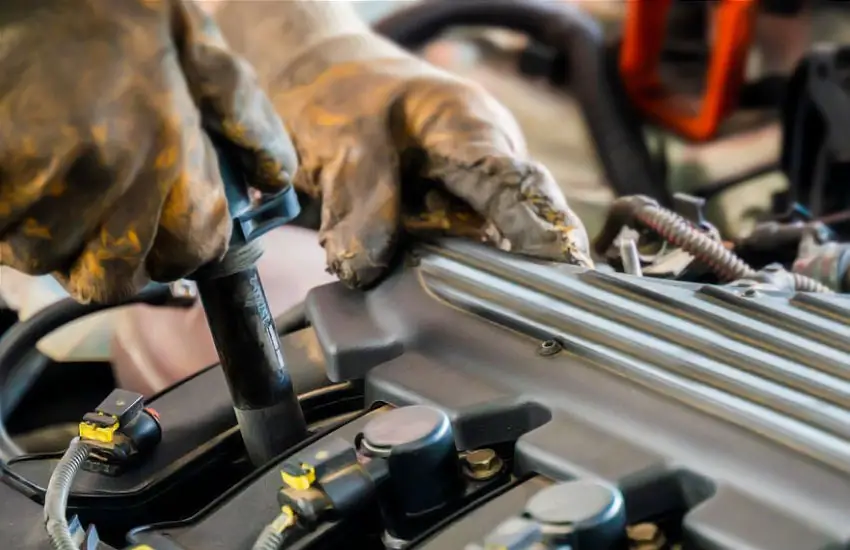As an Amazon Associate, I earn from qualifying purchases at no extra cost to you.
Transmission Troubles? Here Are the Signs You Shouldn’t Miss!
You might be driving your car when suddenly you feel something’s off. Transmission troubles can be sneaky, and if you don't catch them early, they can lead to big problems. In this blog post, we'll talk about the signs you shouldn't miss. From weird noises to strange shifting, we'll cover all the clues your car gives you. Understanding these signs can help you keep your ride running smoothly and save you money on repairs. So, if you want to keep your car in top shape, keep reading to learn what to watch out for!

Common Signs of Transmission Problems
1. Slipping Gears
One of the first signs that your transmission might have a problem is slipping gears. This means that your car suddenly changes gears without you telling it to. For example, when you are driving and the car seems to lose power or slows down even when your foot is on the gas pedal, it may feel like the engine is revving but the car isn’t speeding up.
This can be dangerous because you may not have full control of your vehicle. Slipping gears can happen when there is not enough transmission fluid or if there is a problem with the internal parts of the transmission. If you notice this happening, it’s important to pay attention.
The sooner you can get it checked by a mechanic, the better. Ignoring this problem can lead to bigger issues and more expensive repairs down the road. Always keep an eye on how your car shifts gears, especially if it happens often.
2. Delayed or Hard Shifting
Another sign of transmission trouble is delayed or hard shifting. This happens when you try to change gears, but the car takes a long time to respond. For example, if you put your car into drive, and it takes a moment for the car to start moving, that’s a delay. A hard shift can feel like a sudden jerk when the car changes gears.
This can happen in both automatic and manual transmissions. When these problems occur, it often means that the transmission fluid is low, dirty, or that there is an issue with the gears themselves. If your car is having a hard time shifting, it can make driving uncomfortable and even unsafe.
You may notice it more when you are speeding up or slowing down. If you feel any hard shifts or delays, it's a good idea to get your vehicle checked by a professional. This way, you can prevent further damage and ensure your car runs smoothly.
3. Unusual Noises
Unusual noises coming from your vehicle can be a big sign that something is wrong with your transmission. You might hear grinding, whining, or clunking sounds, especially when you are shifting gears. These noises can be alarming and should not be ignored.
For instance, a grinding sound when changing gears may indicate that the gears are not lining up properly, while a whining noise might mean that the fluid is low or dirty. If you hear these sounds, it could be a sign of wear and tear on the transmission or even a more serious problem.
Ignoring these noises can lead to bigger issues and costly repairs. It's best to pay close attention to any strange sounds. If you notice anything out of the ordinary, make an appointment with a mechanic to get it checked out. Early diagnosis can help fix the problem before it gets worse and keeps your car running safely.
4. Fluid Leaks
Fluid leaks under your car can be a clear sign of transmission problems. Transmission fluid is usually bright red and has a sweet or burning smell. If you see red puddles or spots where you park your car, it is a strong indicator that your transmission is leaking.
Leaks can happen for various reasons, such as worn-out seals or damaged lines. Transmission fluid is crucial for the smooth operation of your vehicle, as it lubricates the internal parts and helps with shifting gears. If you don't fix a leak, the fluid level will continue to drop, which can lead to serious damage and even complete transmission failure.
If you notice any fluid leaks, it is important to get your car checked by a mechanic right away. They can help identify the source of the leak and make the necessary repairs. Taking care of fluid leaks quickly can save you a lot of time and money in the long run.
5. Warning Lights
When driving, if you see warning lights on your dashboard, it is important to pay attention. Many vehicles have a “Check Engine” light that can signal transmission problems. If this light comes on, it usually means that there is an issue that needs to be checked.
Some cars also have a specific “Check Transmission” light that indicates a problem with the transmission system. Ignoring these lights can lead to more significant problems and expensive repairs. If the light comes on, you should not delay in getting your car looked at by a mechanic.
They can use a computer to read the codes from your car and find out what is wrong. Addressing the issue early can prevent bigger problems later. Even if the car seems to be running fine, warning lights are a signal that something needs attention, so always take them seriously.
6. Overheating
Overheating can be another sign of transmission problems that you should not ignore. If your car's transmission gets too hot, it can cause serious damage. You might notice a burning smell, especially when driving or after stopping the car.
Overheating can happen if the transmission fluid is low, dirty, or not circulating properly. It can also occur if the car is under a lot of stress, such as towing a heavy load or driving in hot weather. If your car's temperature gauge rises into the red zone, you should stop driving immediately.
Continuing to drive can cause severe damage to the transmission, leading to costly repairs or even a complete breakdown. It is important to check the transmission fluid levels regularly and keep them at the right level. If you notice any signs of overheating, it's best to have your vehicle checked by a professional mechanic to avoid long-term damage.
7. Poor Acceleration
Poor acceleration can be a troubling sign that your transmission is having issues. If you press the gas pedal and your car does not speed up as it should, this could mean a problem with the transmission. You might feel like the engine is working hard, but the car isn't moving faster.
This sluggish response can be very frustrating, especially when you need to merge into traffic or pass another vehicle. Poor acceleration can happen for several reasons, including low transmission fluid levels, internal transmission problems, or even issues with the engine itself. If your car is having a hard time picking up speed, you should pay attention.
It could lead to unsafe driving conditions and might be a sign of a bigger problem. If you experience this issue often, it is important to take your car to a mechanic who can diagnose the problem and recommend necessary repairs to keep you safe on the road.
8. No Response When Shifting
If your car shows no response when you try to shift into drive or reverse, this is a serious problem. This means that when you move the gear lever, the car does not move or respond at all. This can be very dangerous, especially if you are trying to merge into traffic or park.
A lack of response can be caused by several issues, including low transmission fluid, a malfunctioning transmission control module, or internal damage to the transmission itself. If you find that your vehicle is not responding when you shift gears, it is important to stop driving immediately.
Continuing to drive could cause even more damage to your car, which can lead to very costly repairs. Call a tow truck to take your vehicle to a mechanic as soon as possible. Addressing this problem quickly can help keep you safe and prevent further damage to your transmission.
9. Check Transmission Light
The “Check Transmission” light is an important warning that something is wrong with your transmission system. If this light comes on while you are driving, it means that your car’s computer has detected a problem that needs to be checked.
This light can indicate many issues, such as low transmission fluid, a faulty sensor, or even more serious internal problems. It is important not to ignore this warning light. If it comes on, you should take your vehicle to a mechanic as soon as you can.
They will use special tools to read the error codes and find out what is wrong with the transmission. Ignoring this light can lead to more serious problems and expensive repairs down the road. Always pay attention to warning lights and take them seriously, as they are there to help keep you safe and your vehicle running well.
What to Do If You Notice These Signs
1. Stop Driving
If you experience any severe symptoms, such as no response when shifting gears or significant noises, it is important to stop driving immediately. Continuing to drive your car with transmission problems can cause further damage to the transmission system and make repairs much more expensive. You should pull over to a safe area as soon as you can.
Once you have stopped, turn off the engine and assess the situation. If the car is making strange sounds or if you smell burning, it is a sign that you should not drive it again until it is checked by a mechanic. Stopping as soon as you notice a problem can prevent serious damage and keep you safe on the road.
Always listen to your instincts. If something doesn't feel right with your car, it's better to be safe than sorry. Call for help or a tow truck to get your vehicle to a mechanic instead of risking driving it.
2. Check Fluid Levels
Regularly checking your transmission fluid levels is a simple yet essential step in maintaining your vehicle. If you notice any signs of transmission trouble, it's a good idea to check the fluid first. To do this, open the hood of your car and locate the transmission fluid dipstick. Pull it out, wipe it clean, and insert it back into the tube.
Then, remove it again to check the fluid level. The fluid should be bright red and at the correct level according to the markings on the dipstick. If the fluid is low, you can add the appropriate type of transmission fluid for your vehicle. Low fluid levels can lead to many transmission problems, so keeping them topped off is crucial.
In addition to checking the level, also inspect the fluid’s color and smell. If the fluid is dark or smells burnt, it may be time for a fluid change. Always ensure you are using the right type of fluid for your specific vehicle to prevent any additional problems.
3. Visit a Mechanic
If you notice any signs of transmission trouble, it's best to have a qualified mechanic inspect your vehicle. A professional can diagnose the problem accurately and recommend the necessary repairs. If your car is showing symptoms like slipping gears or unusual noises, don't wait too long to get it checked.
Mechanics have the tools and expertise to find the root cause of the issue. They can perform diagnostic tests that help identify problems that you might not be able to see. Getting your car serviced promptly can save you money and stress down the line.
When visiting the mechanic, describe the symptoms you've noticed. This information can help them diagnose the issue more quickly and accurately. Don't hesitate to ask questions about what needs to be done and why. Understanding the repairs can help you make informed decisions about your vehicle.
4. Regular Maintenance
Keeping up with regular maintenance is one of the best ways to prevent transmission problems. Regular checks of your transmission fluid levels and scheduled fluid changes can help your transmission run smoothly. Follow your vehicle manufacturer’s maintenance schedule to keep your car in good shape.
During routine maintenance, a mechanic can also check for any signs of wear and tear or leaks that could lead to bigger issues later. Preventive care is key to avoiding costly repairs down the line. It's usually less expensive to maintain your vehicle than to fix major problems after they occur.
In addition to transmission checks, also keep an eye on other vital systems in your car, like the engine and brakes. A well-maintained vehicle is more reliable and safer to drive. Don't wait until something goes wrong; stay proactive with your car's care.
5. Consider a Transmission Flush
If your transmission fluid is dark or has a burnt smell, consider having a transmission flush. This process removes old fluid and contaminants from the system and replaces it with fresh fluid. A transmission flush can help improve performance and extend the life of your transmission.
Flushing the transmission fluid can help clear out any debris or build-up that might be causing shifting issues. It is usually recommended every 30,000 to 60,000 miles, but you should check your owner's manual for specific recommendations. If you are unsure, a mechanic can advise you on whether a flush is necessary.
However, if your transmission has severe problems, a flush may not fix everything. In some cases, it could even cause more damage. Always discuss your options with a trusted mechanic before deciding on a transmission flush.
6. Keep Track of Your Driving Habits
Your driving habits can greatly affect your transmission’s health. If you often tow heavy loads, drive in stop-and-go traffic, or make quick starts and stops, these actions can put extra stress on your transmission. Being aware of how you drive can help you identify potential issues before they become serious problems.
Try to drive smoothly and avoid rapid accelerations whenever possible. Also, pay attention to how your car responds when you shift gears. If you notice any issues during your daily driving, it's essential to address them promptly.
If your driving style changes, like needing to haul a trailer, consider consulting a mechanic about how to better care for your transmission. They can offer tips and maintenance recommendations to ensure that your transmission stays in good condition, especially under more demanding driving conditions.
7. Pay Attention to Changes in Performance
Always pay attention to changes in your vehicle’s performance. If your car feels different when you drive it, such as a lack of power during acceleration or unusual noises, these can be signs of transmission trouble. Taking notice of any changes can help you catch problems early and prevent them from getting worse.
Keep track of how your car handles in different situations, like driving uphill or merging onto highways. If you start to feel any unusual vibrations, delays, or difficulties shifting, these are signals that you should take action.
Document any changes you notice and mention them to your mechanic when you go in for a check-up. Detailed descriptions of your car's performance can help the mechanic diagnose the issue more effectively, ensuring you get the right repairs done as quickly as possible.
8. Research Your Vehicle's Transmission
Understanding your vehicle's transmission type and how it works can help you take better care of it. Different vehicles have different maintenance needs, so it's important to research your specific model. Check your owner's manual for details on the transmission system, including fluid change intervals and maintenance recommendations.
Learning about your transmission can also help you spot potential issues early. For instance, knowing how to check fluid levels and what the fluid should look and smell like will prepare you to catch problems before they become serious.
If you have questions, don't hesitate to ask your mechanic for advice. They can provide valuable insights into your vehicle’s transmission and offer tips on how to keep it in great shape. Being informed will help you make better decisions about your car's care.
9. Trust Your Instincts
Finally, always trust your instincts when it comes to your vehicle. If you feel that something is off with your transmission or any part of your car, don't hesitate to investigate. Your safety is the most important thing.
Sometimes, even small changes can indicate a bigger problem. If you have a gut feeling that something isn't right, it's better to be safe and get your car checked out. Ignoring small signs can lead to significant issues later on, which can be both costly and dangerous.
Staying aware and proactive about your car’s condition is essential. By paying attention to your instincts, you can help keep your vehicle safe and reliable. Always prioritize your safety and don't put off addressing any concerns you have about your car.
I hope this guide helps you understand the signs of transmission problems in your car. If you notice any issues, remember to stop driving and get your vehicle checked by a mechanic. Regular maintenance and paying attention to how your car feels can keep it running smoothly. Taking action early can save you money and keep you safe on the road.
Are these Questions in Your Mind?
Is it safe to drive with transmission problems?
No, it is not safe to drive with transmission problems. Doing so can lead to further damage and increase the risk of an accident. If you notice any signs of transmission issues, it's best to stop driving and have your car checked by a mechanic.
Can a transmission be repaired, or does it need to be replaced?
In many cases, a transmission can be repaired, depending on the type and severity of the problem. Minor issues, like fluid leaks, can often be fixed. However, more serious problems may require a complete replacement. A mechanic can help determine the best solution for your vehicle.
Do I need special tools to check my transmission fluid?
No, you do not need special tools to check your transmission fluid. Most vehicles have a dipstick for checking the fluid level. You only need to pull it out, wipe it clean, and insert it back to check the level and color of the fluid.
Is it normal for my transmission fluid to change color?
Yes, it is normal for transmission fluid to change color over time. Fresh transmission fluid is usually bright red. If it becomes dark brown or black, it may indicate that it is dirty or burnt, which means it needs to be changed.
Can low transmission fluid cause my car to overheat?
Yes, low transmission fluid can cause your car to overheat. Transmission fluid helps keep the system cool and lubricated. If the fluid is low, it can lead to overheating, which can damage the transmission and other parts of your vehicle.
Do I need to change my transmission fluid regularly?
Yes, you should change your transmission fluid regularly to keep your transmission in good condition. Most manufacturers recommend changing the fluid every 30,000 to 60,000 miles, but you should check your owner's manual for specific guidelines for your vehicle.
Is it necessary to flush my transmission fluid?
While not always necessary, flushing your transmission fluid can be helpful if the fluid is dirty or burnt. Flushing can remove debris and contaminants, but it should be done according to your vehicle's maintenance schedule and recommendations from a mechanic.
Can I drive my car if the “Check Transmission” light is on?
No, you should avoid driving your car if the “Check Transmission” light is on. This warning indicates a potential issue with your transmission system that needs to be addressed. Continuing to drive can cause more damage, so it's best to have your car checked immediately.
Do I have to take my car to a dealership for transmission repairs?
No, you don't have to take your car to a dealership for transmission repairs. Many independent mechanics are qualified to handle transmission issues. However, make sure to choose a trusted mechanic with experience in your vehicle make and model.
Is it normal for my transmission to make noise when shifting?
No, it is not normal for your transmission to make noise when shifting. If you hear grinding, clunking, or whining sounds, it could indicate a problem with the transmission. It is essential to have it checked by a mechanic if you notice any unusual noises.











